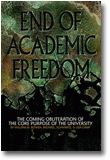
End of Academic Freedom
The Coming Obliteration of the Core Purpose of the University
By:
William M. Bowen, Cleveland State University
Michael Schwartz, Cleveland State University
Lisa Camp, Case School of Engineering
Published 2014
This book is premised upon the assumption that the core purpose of universities is to create, preserve, transmit, validate, and find new applications for knowledge. It is written in the perspective of critical university studies, in which university governance processes should take ideas and discourse about ideas seriously, far more seriously than they are often taken within many of to day's universities, since doing so is the key to achieving this purpose. Specifically, we assert that the best way for universities to take ideas seriously, and so to best achieve their purpose, is to consciously recognize and conserve the entire range of available ideas. Though the current emphasis upon factors such as student headcounts, increased efficiency and job creation are undoubtedly important, far more is at stake in universities than only these factors.
From this premise, we deduce insights and arguments about academic freedom, as well as factors such control and monitoring of the market place of ideas, the structure of information flows within universities, the role of language in university governance, and relationships between administrators, faculty members and students. We identify impediments to achieving the core purpose of universities, including the idea vetting systems of authoritarianism, corporatism, illiberalism, supernaturalism and political correctness. We elucidate how these impediments inhibit successful achievement of the core purpose of the university. In response to these impediments we prescribe relatively autonomous universities characterized by openness, transparency, dissent, and the maintenance of balance between conflicting perspectives, values, and interests.
CONTENTS
Foreword, David F. Forte. Preface. 1. A Brief History of the Purpose of American Higher Education. 2. The Core Purpose of the University. 3. Understanding Today’s Universities: Thought, Language, Behavior. 4. The Ins and Outs of Knowledge Formation in University Communities. 5. The Vital Function of Ideational Variety in Knowledge Formation. 6. Five Great Impediments to Academic Freedom. 7. The Great Impediments, Idea Failures, and Their Impacts on Society. 8. Surviving the Threats and Emerging as the Storehouse of Ideas. 9. A Question of Values: The Promise and Productivity of American Universities. Notes. References. About the Authors.
REVIEWS
"Who will benefit from reading this book? Whether psychologist or not, any academic who is concerned with the drift and shift in academic values that appears to be happening on many, if not most, campuses in the United States will want to become familiar with the work’s portents. Since it is something akin to a call to arms (or at least minds), I do not believe this is the sort of book to be read in the solitude of one’s own ivory tower or philosophical armchair. This is a book about an imperiled community as well as an imperiled “sense of community,†and how shared visions and traditions are under assault, sometimes in apparent ways and other times in more subtle but still corrosive ways that often masquerade as “necessary†choices or decisions. Colleagues who value institutional shared governance or who are constructively active in campus politics (I am thinking here of faculty senates and the like) should read this book; indeed, they should consider forming discussion groups or panel presentations.
Administrators from the top on down, from presidents and provosts to deans and department chairs should read this book if only to learn why so many of their faculty colleagues are restive and restless, if not resentful. Bowen, Schwartz, and Camp are not really telling us what we don’t already know—they are giving us a nuanced and reflective, if sometimes distressing, account of it. Trustees and regents, too, should read this book if only to try to understand the critical faculty worldview that likely puzzles or annoys them. The university was conceived to be a place apart from the worlds of commerce, government, and even private life—this feature is a key to maintaining academic freedom, and nonacademics should be aware of this fact." Dr. Dana S. Dunn Moravian College in PsyCritiques (Read full review)
"The aim of analyzing the core purpose of contemporary universities is a highly welcome one, considering that institutions of higher education today are rapidly changing and highly exposed and susceptive to shifting political regimes of governance. These pressures interfere with the institutional autonomy they have achieved to varying degrees, depending upon the different political and historical contingencies and the social contexts they are situated in. The situation calls for differentiated and comparative analytical approaches to meet the promise of the title of the book, talking about ‘the core’ purpose and ‘the coming’ of certain threats against academic freedom." Claus Emmeche University of Copenhagen in Science and Education
-
Paperback9781623966584
Web price: $45.04 (Reg. 52.99)
-
Hardcover9781623966591
Web price: $80.74 (Reg. 94.99)
- eBook9781623966607

-
 (Re)Envisioning Social Studies Education Research
Current Epistemological and Methodological Expansions, Deconstructions, and Creations
(Re)Envisioning Social Studies Education Research
Current Epistemological and Methodological Expansions, Deconstructions, and Creations
-
 Affirming Identity, Advancing Belonging, and Amplifying Voice in Sororities and Fraternities
Affirming Identity, Advancing Belonging, and Amplifying Voice in Sororities and Fraternities
-
 Expanding the Vision of Faculty Learning Communities in Higher Education
Emerging Opportunities for Faculty to Engage Each Other in Learning, Teaching, and Support
Expanding the Vision of Faculty Learning Communities in Higher Education
Emerging Opportunities for Faculty to Engage Each Other in Learning, Teaching, and Support
-
 Faculty Learning Communities
Working Towards a More Equitable, Just, and Antiracist Future in Higher Education
Faculty Learning Communities
Working Towards a More Equitable, Just, and Antiracist Future in Higher Education
-
 Institutional Diversity in American Postsecondary Education
Institutional Diversity in American Postsecondary Education
-
 Promoting Equitable Classroom Practices in Higher Education
Approaches Beyond Curriculum
Promoting Equitable Classroom Practices in Higher Education
Approaches Beyond Curriculum
-
 The Handbook for Aspiring Higher Education Leaders
The Handbook for Aspiring Higher Education Leaders

